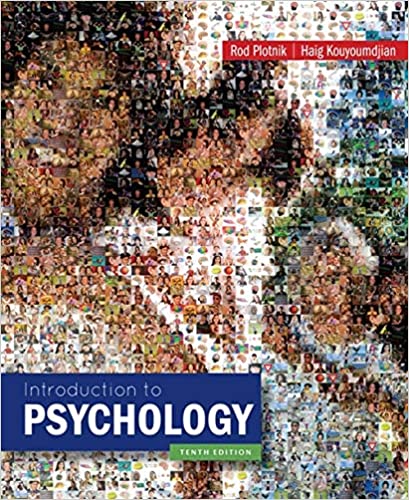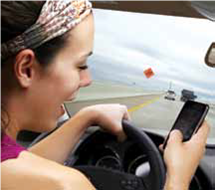
Introduction to Psychology 10th Edition by Rod Plotnik,Haig Kouyoumdjian
Edition 10ISBN: 978-1133939535
Introduction to Psychology 10th Edition by Rod Plotnik,Haig Kouyoumdjian
Edition 10ISBN: 978-1133939535 Exercise 7
Texting: How Distracting Can It Be?
YouTube has videos of young adults texting while driving, and Facebook has a group called I Text Message People While Driving and I Haven't Crashed Yet! Many people are routinely texting while on the move, whether it's waiting in line for coffee, walking across the street, or driving.
Is texting a big enough distraction to put people at risk of danger? The American College of Emergency Physicians believes so. They report that many people arrive in the emergency department with serious, sometime fatal injuries because they weren't paying attention to their surroundings while texting.
Be honest-how many times have you been texting while driving and looked up only to be surprised you haven't been paying attention to the road? The dangers of texting while driving are so serious that 35 states and the District of Columbia have laws banning text messaging for all drivers. Though no state entirely bans the use of cell phones while driving, nine states and the District of Columbia ban drivers from using handheld cell phones while driving. It seems that the restrictions on using phones while driving will only become more strict. For instance, the Transportation Department has recently proposed guidelines aimed at disabling test messaging, Internet browsing, navigation destination entry, and phone dialing if the car is not in the Park position.
The use of a cell phone in any way while driving increases the risk of an accident, and texting is more dangerous than talking. A driver's risk of getting into an accident is believed to increase sixfold when texting and fourfold when talking on a handheld cell phone. One study reported that texting increases the risk of a near-crash by up to 23 times. Another study found that cell phone use caused distractions comparable to those that occur while driving intoxicated.
Not only is texting distracting during our waking day, but for some, it can be a problem during sleep. Teens and young adults, in particular, go to sleep with their phones plugged in right by their beds. With every beep of a new text message, they awaken, disrupting their sleep and thereby affecting their cognitive and physical performance the next day. There have even been rumors of sleep texting-that is, texting during sleep only to discover in the morning the texts sent in the middle of night. The dangers of texting seem countless: injuring oneself or others, death, and tremendous embarrassment (who knows what you might text while asleep!).
Question
Which type of brain wave occurs when you are text messaging?
YouTube has videos of young adults texting while driving, and Facebook has a group called I Text Message People While Driving and I Haven't Crashed Yet! Many people are routinely texting while on the move, whether it's waiting in line for coffee, walking across the street, or driving.
Is texting a big enough distraction to put people at risk of danger? The American College of Emergency Physicians believes so. They report that many people arrive in the emergency department with serious, sometime fatal injuries because they weren't paying attention to their surroundings while texting.
Be honest-how many times have you been texting while driving and looked up only to be surprised you haven't been paying attention to the road? The dangers of texting while driving are so serious that 35 states and the District of Columbia have laws banning text messaging for all drivers. Though no state entirely bans the use of cell phones while driving, nine states and the District of Columbia ban drivers from using handheld cell phones while driving. It seems that the restrictions on using phones while driving will only become more strict. For instance, the Transportation Department has recently proposed guidelines aimed at disabling test messaging, Internet browsing, navigation destination entry, and phone dialing if the car is not in the Park position.
The use of a cell phone in any way while driving increases the risk of an accident, and texting is more dangerous than talking. A driver's risk of getting into an accident is believed to increase sixfold when texting and fourfold when talking on a handheld cell phone. One study reported that texting increases the risk of a near-crash by up to 23 times. Another study found that cell phone use caused distractions comparable to those that occur while driving intoxicated.

Not only is texting distracting during our waking day, but for some, it can be a problem during sleep. Teens and young adults, in particular, go to sleep with their phones plugged in right by their beds. With every beep of a new text message, they awaken, disrupting their sleep and thereby affecting their cognitive and physical performance the next day. There have even been rumors of sleep texting-that is, texting during sleep only to discover in the morning the texts sent in the middle of night. The dangers of texting seem countless: injuring oneself or others, death, and tremendous embarrassment (who knows what you might text while asleep!).
Question
Which type of brain wave occurs when you are text messaging?
Explanation
EEG obtained after the diagnosis of the ...
Introduction to Psychology 10th Edition by Rod Plotnik,Haig Kouyoumdjian
Why don’t you like this exercise?
Other Minimum 8 character and maximum 255 character
Character 255


